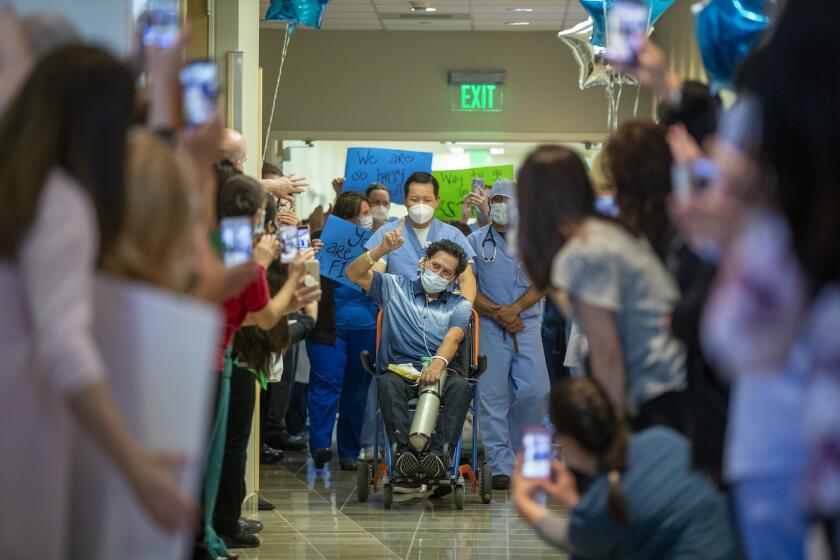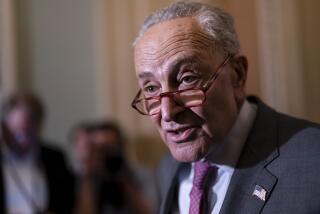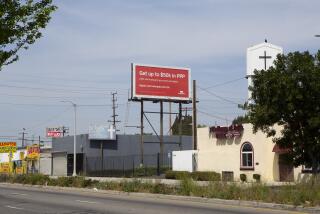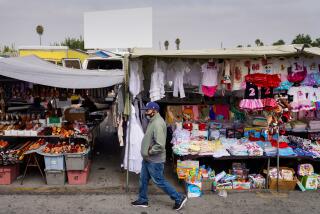Senate close to deal on more coronavirus funds for small businesses as critics say too much went to big firms
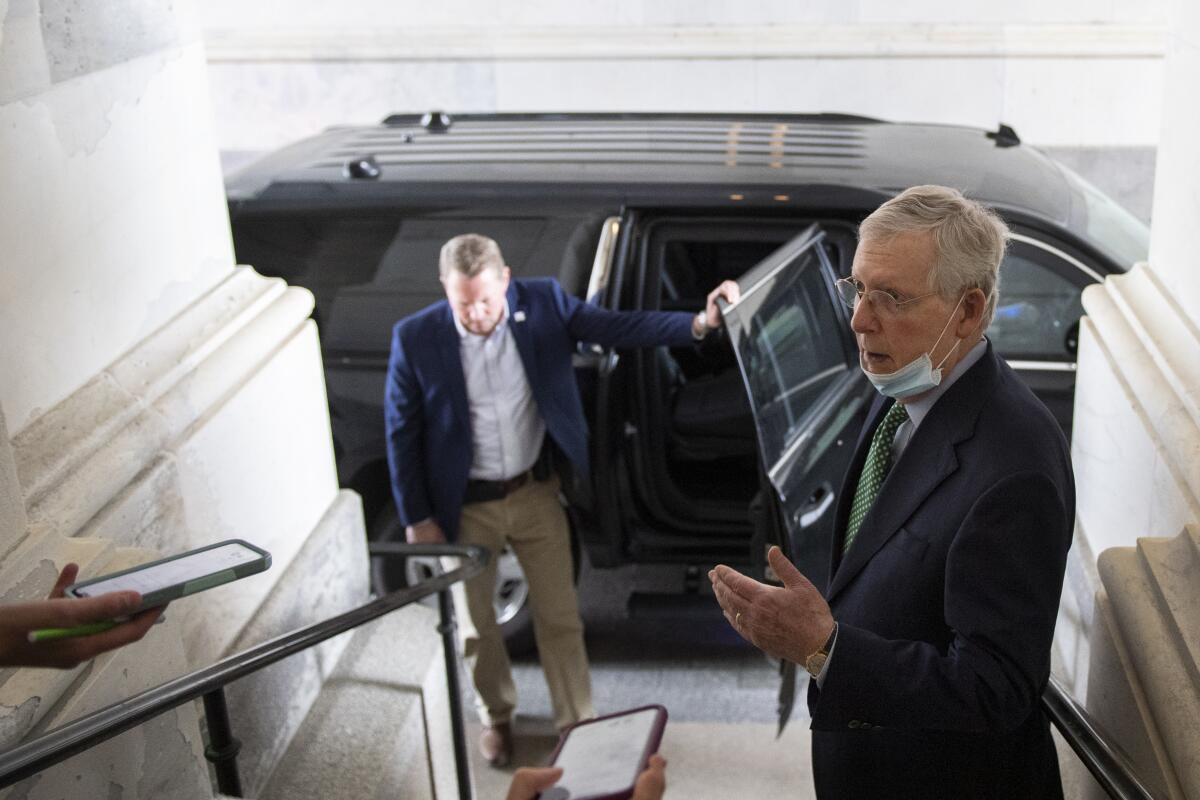
- Share via
WASHINGTON — Congressional leaders and the White House were close to a deal Monday over an emergency coronavirus package to replenish a small-business assistance program that ran out of funds last week, even as critics said misuse of the popular loan program by large companies had squeezed out smaller businesses.
The now-depleted Paycheck Protection Program was designed to provide forgivable loans to small businesses if they kept workers on the payroll during the economic shutdown caused by the pandemic.
It would receive an additional $310 billion under the spending deal being negotiated, with a portion set aside to be lent by smaller banks in an effort to help smaller businesses that may have been shut out of the initial $349-billion disbursement.
These are some of the unusual new scenes across the Southland during the coronavirus outbreak.
The package would add $60 billion to a separate emergency loan program for small businesses that also is out of money, $75 billion for hospitals, and $25 billion to increase COVID-19 testing.
Senate and House leaders and Treasury Secretary Steven T. Mnuchin were optimistic a deal was close Sunday, and it appears that the basic outline has been agreed to by all sides. House Speaker Nancy Pelosi (D-San Francisco) told CNN Monday night the final language was being negotiated and a deal was expected so the Senate could vote Tuesday and the House on Wednesday.
Among the final points of contention is a proposal to also provide $150 billion in aid to states and municipalities struggling with a sharp drop in tax revenue. Democrats say Congress needs to act quickly to shore up those entities’ budgets, but Republicans and the White House want to wait.
“We’re going to be saving that for ... a later date,” Trump said Sunday, adding that he supports the idea. “That will probably be in our next negotiation.”
Senate Majority Leader Mitch McConnell (R-Ky.) said Monday that the Senate would convene for a previously unscheduled session Tuesday afternoon in hopes that a deal will have been reached by then.
“Republicans have been trying to secure more funding for this critical program for a week and a half,” McConnell said on the Senate floor. “At this hour, our Democratic colleagues are still prolonging their discussions with the administration, so the Senate won’t be able to pass more funding for Americans’ paychecks today.”
In a remarkable State of the City address, Mayor Eric Garcetti said L.A. is “under attack” from the coronavirus, with its daily life “unrecognizable.” He said major cuts would be needed.
Democrats blamed Republicans for resisting their efforts to provide additional money to hospitals and local governments, and to ensure that smaller businesses that don’t have strong banking relationships will be included in the next phase of forgivable loans.
With most lawmakers out of Washington due to the coronavirus, any deal would need unanimous bipartisan support to pass by voice vote. A single senator or representative in Washington could object, which would delay passage and require hundreds of members of Congress to return to the Capitol to vote.
The Paycheck Protection Program burned through its original $349 billion just three weeks after Congress passed a nearly $2-trillion economic relief package.
Some lawmakers and small businesses are complaining that too much of that money went to large, nationwide restaurant chains, like Potbelly Sandwich Shop and Ruth’s Chris Steak House, both of which reportedly received multimillion-dollar loans.
Though the program was targeted at businesses with fewer than 500 workers, a provision allowed subsidiaries and individual locations to apply separately for money, even if they were part of a larger company or chain that would have been too large to qualify.
After social media backlash, New York-based hamburger chain Shake Shack said on Monday it would return the $10-million loan it had received.
Shake Shack CEO Randy Garutti and founder Danny Meyer said in a statement that the program rules were unclear and that they didn’t realize how quickly it would run out of money.
“The ‘PPP’ came with no user manual and it was extremely confusing,” the executives said in the statement. After arranging for additional capital, Shake Shack decided “to immediately return the entire $10 million PPP loan we received last week to the SBA so that those restaurants who need it most can get it now.”
Sen. Rick Scott (R-Fla.), one of the first lawmakers to express frustration with the Paycheck Protection Program, says businesses should have to prove they have taken a financial hit from the coronavirus to get the money.
“You ought to have a big downturn in your business before you get this money — any of this money. Not just PPP,” he said in an interview. “We shouldn’t be just going out there and wasting money.”
Scott said he’d spoken to McConnell about adding new requirements to the fund but that it was unclear whether he could get it added to an interim package or later legislation. He’s also spoken to the Small Business Administration about revising its rules but believes Congress would have to enact new language.
“I think we have a shot at getting this fixed. I’m optimistic. This is pretty basic,” he said. The law should “help the people who should be helped. Our job is not to bail out the rich and people who are doing well.”
John Bamberger, 69, of Westlake Village, said he finished his application for $285,000 five minutes after the application process opened in March and he still didn’t have a response.
His company imports specialty foods from Britain and Australia, and with grocery stores focusing on staples and some specialty stores that he supplies shut down entirely, he’ll have to furlough workers and cut costs because he hasn’t gotten the loan, he said.
He said Congress should have paid more attention to where the money was going and how it was going to be distributed.
“It pisses me off,” Bamberger said. “You read that Ruth’s Chris got whatever they got. Shake Shack wants all of a sudden to give their loan back. I don’t know why they applied in the first place. But certainly the money is not going to the people who need it.”
Sen. Marco Rubio (R-Fla.), who chairs the Senate small business committee, said his panel would “conduct aggressive oversight into the use of PPP” this fall, and into what he described as “multiple reports of companies abusing the program.”
“Any business, regardless of size, must certify it has been harmed by the coronavirus crisis and that PPP is necessary to maintain operations,” Rubio said in a statement.
California Sens. Dianne Feinstein and Kamala Harris also demanded Monday that Mnuchin explain why California received the fewest number of loans — in relation to the total number of small businesses — of any state. Citing a Wall Street Journal comparison, the senators argued that California’s businesses have been closed longer than those in other states and “it is difficult to understand why California’s small businesses would qualify for so much less aid than others.”
More to Read
Sign up for Essential California
The most important California stories and recommendations in your inbox every morning.
You may occasionally receive promotional content from the Los Angeles Times.
